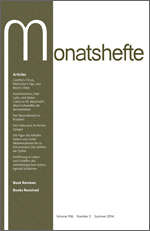|


|

View Online Edition
Subscribe Online
Activate Your Subscription
Sign up for email updates
Editorial Board
Back Issue TOC's
Advertising Rates
Artwork Guidelines
Index/Abstracts
Recommend Monatshefte
Submission Guidelines
Monatshefte 2017 Subscription Rates
Libraries & Institutions:
print & online $230
online only $198
Individuals:
print & online $90
online only $75
Non U.S. Postage (no postage charges for electronic only subscriptions)
Airmail: add $40/yr.
Canadian Subscribers: add 5% GST. |
Monatshefte
Volume 90, Number 4, Winter 1998 Table of Contents
Texts and Documents
Peter Weiss
Zwei Breife an Reinhold Grimm, erläutert vom Adressaten
Surely Peter Weiss needs no introduction. His two letters to Reinhold Grimm were written in 1978 and 1982, respectively. The first refers to an international conference on contemporary literature held at the University of Wisconsin–Madison, which featured Fernando Arrabal, Sławomir Mrożek, and Natalie Sarraute, among others; the second refers to the introductory speech Grimm gave in Darmstadt on the occasion of the founding of the Georg Büchner Gesellschaft. It goes without saying that neither letter has been published previously. (RG) (In German)
Articles
Gerhard Richter
Face-Off
Abstract:
The late work of Walter Benjamin stages a perpetual confrontation with German fascism. Benjamin predicates the effectiveness of his aesthetic and theoretical positions in the struggle against fascism upon the development of a series of innovative and “unusable” concepts. However, he defers the specification of such concepts. This essay shows that instead of explaining what these concepts are, Benjamin enacts their transgressive movement in his language. In the context of his problematization of the body, the figure of the face, which permeates his entire corpus, emerges as precisely such a new and “unusable” concept. Benjamin’s rhetoric of the face, which places him into an illuminating constellation with his contemporaries, becomes visible as a site of self-differentiation upon which key Benjaminian notions of politics, culture, and reading converge. (GR)
Rolf J. Goebel
Paris, Capital of Modernity: Kafka and Benjamin
Abstract:
An important if neglected topos connecting Walter Benjamin and Franz Kafka is the depiction of Paris as the capital of modernity. This essay situates Kafka’s Paris episode from “Beschreibung eines Kampfes” (1904–07?) and his notes of a visit to the French capital (1911) in the context of Benjamin’s Passagen-Werk and his comments on Baudelaire (1927–40). The comparison yields surprising correspondences: the phantasmagoric inscription of history in the present, fashion, the imitation of nature in urban space, the reign of façades, the disorientation of the human subject in the anonymous crowds and hectic traffic, and the disappearing figure of the flâneur. Placed in the constellation of Benjamin’s dense socio-cultural analysis, the allusive surface signifiers of Kafka’s Paris become readable as ironic emblems of commodity capitalism, bourgeois self-representation, and the fragmentation of experience in modern urbanity. (RJG)
Douglas Brent McBride
Romantic Phantasms: Benjamin and Adorno on the Subject of Critique
Abstract:
It has often been assumed that Walter Benjamin’s dialogue with Theodor W. Adorno on popular culture ended in an antinomy, with Adorno’s fear of manipulation canceling Benjamin’s hope for emancipation. Following a tip from Adorno, this essay analyzes their dispute as the clash between two models of Romantic subjectivity: bourgeois individuation and democratic socialization. These divergent concepts of political and aesthetic subjectivity are paradigmatically represented in the two friends’ contrasting interpretations of Charlie Chaplin’s woefully inept “eccentric.” By tracing how Benjamin and Adorno exorcise the ghosts of Romantic subjectivity, this essay arrives at a new point of departure, indicated by their common interest in technological progress. Here Benjamin’s notion of the “dispersed mass” is explicated as a post-Romantic model of critical subjectivity developed to meet the exigencies of modern media culture. (DBM)
Personalia
Introduction, German Departments in the U.S.A., German Departments in Canada, Promotions, New Appointments, Visitors, Retirements, Necrology, Doctoral Dissertations, Summary
Book Reviews
Index Volume 90 (1998)
|




